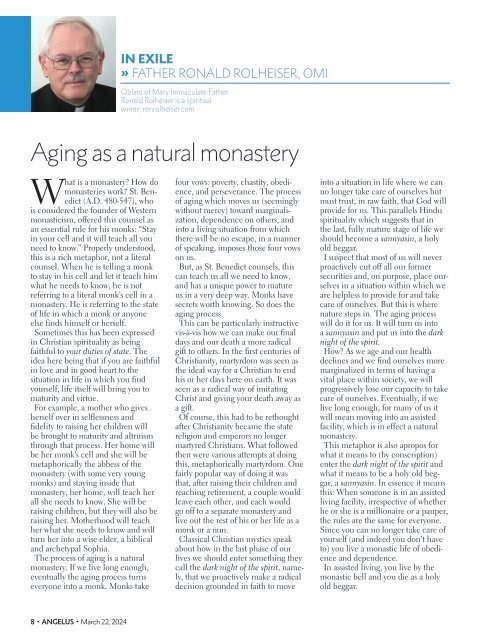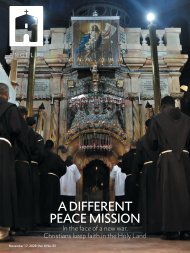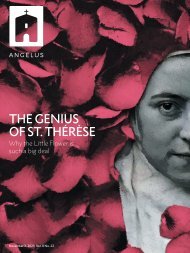Angelus News | March 22, 2024 | Vol. 9 No. 6
On the cover: To cap off a nearly five-decades-long career working in Church communications, Francis X. Maier had an ambitious book idea: a ‘snapshot’ of the Church in America at this time in history that captured both its strengths and its sicknesses. On Page 10, Maier shares what he took away from hearing more than 100 “confessions”’ with American Catholic leaders for the project. On Page 20, John L. Allen Jr. offers his own diagnosis of the uneasy relationship between U.S. Catholics and Rome during the Pope Francis pontificate.
On the cover: To cap off a nearly five-decades-long career working in Church communications, Francis X. Maier had an ambitious book idea: a ‘snapshot’ of the Church in America at this time in history that captured both its strengths and its sicknesses. On Page 10, Maier shares what he took away from hearing more than 100 “confessions”’ with American Catholic leaders for the project. On Page 20, John L. Allen Jr. offers his own diagnosis of the uneasy relationship between U.S. Catholics and Rome during the Pope Francis pontificate.
You also want an ePaper? Increase the reach of your titles
YUMPU automatically turns print PDFs into web optimized ePapers that Google loves.
IN EXILE<br />
FATHER RONALD ROLHEISER, OMI<br />
Oblate of Mary Immaculate Father<br />
Ronald Rolheiser is a spiritual<br />
writer; ronrolheiser.com<br />
Aging as a natural monastery<br />
What is a monastery? How do<br />
monasteries work? St. Benedict<br />
(A.D. 480-547), who<br />
is considered the founder of Western<br />
monasticism, offered this counsel as<br />
an essential rule for his monks: “Stay<br />
in your cell and it will teach all you<br />
need to know.” Properly understood,<br />
this is a rich metaphor, not a literal<br />
counsel. When he is telling a monk<br />
to stay in his cell and let it teach him<br />
what he needs to know, he is not<br />
referring to a literal monk’s cell in a<br />
monastery. He is referring to the state<br />
of life in which a monk or anyone<br />
else finds himself or herself.<br />
Sometimes this has been expressed<br />
in Christian spirituality as being<br />
faithful to your duties of state. The<br />
idea here being that if you are faithful<br />
in love and in good heart to the<br />
situation in life in which you find<br />
yourself, life itself will bring you to<br />
maturity and virtue.<br />
For example, a mother who gives<br />
herself over in selflessness and<br />
fidelity to raising her children will<br />
be brought to maturity and altruism<br />
through that process. Her home will<br />
be her monk’s cell and she will be<br />
metaphorically the abbess of the<br />
monastery (with some very young<br />
monks) and staying inside that<br />
monastery, her home, will teach her<br />
all she needs to know. She will be<br />
raising children, but they will also be<br />
raising her. Motherhood will teach<br />
her what she needs to know and will<br />
turn her into a wise elder, a biblical<br />
and archetypal Sophia.<br />
The process of aging is a natural<br />
monastery. If we live long enough,<br />
eventually the aging process turns<br />
everyone into a monk. Monks take<br />
four vows: poverty, chastity, obedience,<br />
and perseverance. The process<br />
of aging which moves us (seemingly<br />
without mercy) toward marginalization,<br />
dependence on others, and<br />
into a living situation from which<br />
there will be no escape, in a manner<br />
of speaking, imposes those four vows<br />
on us.<br />
But, as St. Benedict counsels, this<br />
can teach us all we need to know,<br />
and has a unique power to mature<br />
us in a very deep way. Monks have<br />
secrets worth knowing. So does the<br />
aging process.<br />
This can be particularly instructive<br />
vis-à-vis how we can make our final<br />
days and our death a more radical<br />
gift to others. In the first centuries of<br />
Christianity, martyrdom was seen as<br />
the ideal way for a Christian to end<br />
his or her days here on earth. It was<br />
seen as a radical way of imitating<br />
Christ and giving your death away as<br />
a gift.<br />
Of course, this had to be rethought<br />
after Christianity became the state<br />
religion and emperors no longer<br />
martyred Christians. What followed<br />
then were various attempts at doing<br />
this, metaphorically martyrdom. One<br />
fairly popular way of doing it was<br />
that, after raising their children and<br />
reaching retirement, a couple would<br />
leave each other, and each would<br />
go off to a separate monastery and<br />
live out the rest of his or her life as a<br />
monk or a nun.<br />
Classical Christian mystics speak<br />
about how in the last phase of our<br />
lives we should enter something they<br />
call the dark night of the spirit, namely,<br />
that we proactively make a radical<br />
decision grounded in faith to move<br />
into a situation in life where we can<br />
no longer take care of ourselves but<br />
must trust, in raw faith, that God will<br />
provide for us. This parallels Hindu<br />
spirituality which suggests that in<br />
the last, fully mature stage of life we<br />
should become a sannyasin, a holy<br />
old beggar.<br />
I suspect that most of us will never<br />
proactively cut off all our former<br />
securities and, on purpose, place ourselves<br />
in a situation within which we<br />
are helpless to provide for and take<br />
care of ourselves. But this is where<br />
nature steps in. The aging process<br />
will do it for us. It will turn us into<br />
a sannyasin and put us into the dark<br />
night of the spirit.<br />
How? As we age and our health<br />
declines and we find ourselves more<br />
marginalized in terms of having a<br />
vital place within society, we will<br />
progressively lose our capacity to take<br />
care of ourselves. Eventually, if we<br />
live long enough, for many of us it<br />
will mean moving into an assisted<br />
facility, which is in effect a natural<br />
monastery.<br />
This metaphor is also apropos for<br />
what it means to (by conscription)<br />
enter the dark night of the spirit and<br />
what it means to be a holy old beggar,<br />
a sannyasin. In essence it means<br />
this: When someone is in an assisted<br />
living facility, irrespective of whether<br />
he or she is a millionaire or a pauper,<br />
the rules are the same for everyone.<br />
Since you can no longer take care of<br />
yourself (and indeed you don’t have<br />
to) you live a monastic life of obedience<br />
and dependence.<br />
In assisted living, you live by the<br />
monastic bell and you die as a holy<br />
old beggar.<br />
8 • ANGELUS • <strong>March</strong> <strong>22</strong>, <strong>2024</strong>

















